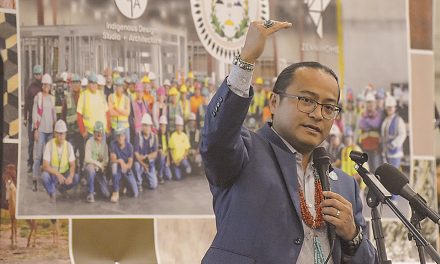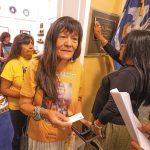
Letters | Hammer hit hard
The Navajo people have spoken with their vote loud and clear. The first message is that the Navajo people were not pleased with their current tribal leadership in the Office of the President and the Navajo Nation Council. The hammer hit hard with the Navajo Nation Council, where the people voted in 2/3 (16) new Council delegates. Add to that change nine Council women and a woman vice president.
With over 250,000 Navajos living off the reservation because of a lack of economic opportunities, it was a driving force in this election.
The Navajo people want jobs so their children and grandchildren can live nearby and enjoy the Navajo Nation. Hundreds of Navajos move off the reservation each year to find jobs and housing.
With over 6,000 businesses unable to physically locate on the reservation, many locate nearby in the border communities where it is easy to set up a business. With only 400 businesses registered with the Navajo Economic Development Office, many complained that the tribal red tape is too cumbersome to locate on Navajo.
With the lack of broadband, the Navajo people were unhappy with the progress to better and improve communication. The lack of broadband and better communication impacted their schools, children, businesses, hospitals, and public safety. The pandemic has changed forever how communities and tribal governments communicate and move information.
Then ARPA and CARE’s funding came along. The Navajo people saw the tribal lawmakers’ inability to make decisions and spend the funding to help the people with basic needs. After one year of trying, the spending slowly started with ARPA spending. By then, many Navajos had passed or moved off the reservation. The Navajo people saw a lack of leadership and demanded change firsthand.
The Navajo people have appointed a new president and 16 new Council delegates. The task is to make life better for the 420,000 Navajo people on and off the reservation. The lawmakers should all be ashamed of an unemployment rate of 40 percent-plus in this time and age. The most important thing for elected officials is to listen to the people, or they will not vote you in next time around.
Going forth, the chapters also need to spend their funding allocations by contracting projects out quickly because depending on tribal departments in Window Rock is too cumbersome. If chapter officials can’t do that, they will also feel the wrath of the voters.
Here is the message loud and clear from this election. Give the Navajo people what they want and do it quickly. Give the people less government red tape, housing, roads, broadband, waterlines, powerlines, jobs, public safety, and good health care. Do that, and you will see another four years of service to the Navajo people.
Marie Rose
Shiprock
Nez walked the walk
I would like to thank President Nez and his administration for their excellent leadership and example over the past four years.
I am not a member of the Navajo Nation (although I have a wife, six children, and 26 grandchildren who are). I have always appreciated the opportunity to live here.
When President Nez took office in 2019, no one saw the monster pandemic coming. It was a challenge, both historic and unprecedented. The steady and consistent leadership pulled the Navajo Nation from a potential tragedy and disaster to a success story that was a model for others.
Hard decisions were made that impacted the economy and educational process for sure. But thankfully, we can never know how many lives were saved and funerals avoided by making the hard choices.
As a health and wellness educator in the Navajo Nation for over 40 years, I greatly appreciated the emphasis and modeling of physical activity, nutrition, and good health habits. President Nez was a strong voice and a great role model for our youth and all of us. He not only talked about it but walked the walk (or, more literally, ran) and led us by example.
Finally, I appreciate that he was always civil and rational, never negatively conducting himself in public. A high level of integrity was maintained throughout the term.
I commend President Nez and his administration for doing outstanding work over the past four years despite almost overwhelming challenges. We wish him and his family all the best in the future.
We also recognize President Nygren and his wife as talented individuals and extend our best wishes to them.
Ahxéhee’ ntsaago.
Ollie Whaley
Kayenta
Housing in the Navajo Nation
The housing for the Navajo Nation is a real issue. This issue is not only isolated to veterans, the elderly, or the homeless.
Although they are among the population in need, the truth is that the availability of housing options is limited in the Navajo Nation. The limitation of housing is a combination of archeology studies, environmental protection issues, excavation issues, grazing rights, homesite leasing, neighbor approvals, right of way disputes, lack of roads, and access to infrastructure needs like water, sewer, and electricity, even after each of these obstacles are overcome it does not address the bigger issue.
The root of the problem is the control of the property. Who wants to invest in a home that has no transactional value? It’s interesting that on the reservation, we have land disputes over land that very few own. Realistically we count on a system that depends on a section 8 program facilitator called NHA (Navajo Housing Authority) to provide all the housing for the Nation.
The Navajo Nation population is about 48% under the poverty level – roughly 52% are above the poverty level, which is more than half of our population living on the Navajo Reservation.
According to these numbers, why do we rely on the government to develop homes for the individuals who can afford to build their homes or pay for accumulative equity dwellings?
In today’s everyday cities, the neighborhoods are divided by income class anytime you enter a metropolitan area.
In the Navajo Nation, we have a bigger problem, and it’s not income, land disputes, relocation, or trust specifications only. It’s the availability of land to build on, allocated assigned land. We are divided by grazing permittee holders that claim to have rights to the land because of animal grazing.
In reality, most grazing permittees do not have any animals, or fewer than half are needed for their allotted permits. They do have control over a vast part of the Navajo Nation. These individuals in the past have held many of the growing communities from progress. Local communities are discouraged by just a few people in the local areas in local economic development.
This is also the same group keeping other Navajo members from moving back to the land set aside for these enrolled members of the Navajo Nation. This is a painful conversation, but if we lose our Navajo population, we lose grant funding for our students, subsidies for our elderly and disabled, and certain rights like water rights.
Discovering the problem is easy, but discovering a solution is finding hope for our people. A solution would be for the tribe to invest in a business with a formation of a section 17 company, a community development corporation (CDC), or a for-profit or non-profit corporation of a group of LGA-certified chapters.
If the chapters were to create apartments or a series of sub-division style lots funded, for example, by the low-income housing tax credit and run it like a mobile park, and create revenue for taxes and place triple wide trailers on the lot; to look like homes, and possibly create income from mobile home sales from funding sources like HUD section 184, FHA, or traditional financing for the residing individuals, this would remove right of way issues for roads, homesite lease issues like neighboring residence’s signatures, and have a controlled environment for infrastructures like running water and electricity, and the chapters can create local ordinances regarding operation and eviction.
Because the Navajo Nation currently has no eviction laws. This is but one way to create an opportunity for our people to avoid the calamity and devastation of a COVID-19 event to eliminate a household when multi-generational individuals live in one house.
Neal Riggs
Leupp, Ariz.








 Highway 264,
Highway 264, I-40, WB @ Winslow
I-40, WB @ Winslow